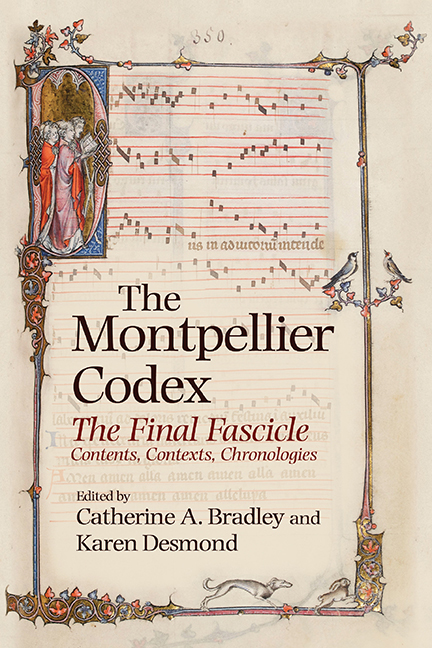Book contents
- Frontmatter
- Contents
- Figures
- Musical examples
- Tables
- Acknowledgements
- List of manuscript sigla
- Abbreviations
- Table of fascicle 8 contents
- Introduction
- I The Material Object
- 1 Montpellier 8: Anatomy of …
- 2 A Palaeographical Analysis of the Verbal Text in Montpellier 8: Problems, Implications, Opportunities
- 3 The Style and Iconography of Montpellier folio 35or
- 4 The Decoration of Montpellier 8: Its Place in the Continuum of Parisian Manuscript Illumination
- 5 Double Motet Layouts in the Montpellier Codex and Contemporaneous Libri motetorum
- 6 Deus in adiutorium Revisited: Sources and Contexts
- 7 Thematic Clusters and Compilational Strategies in Montpellier 8
- II INNOVATION AND TRADITION
- III ANALYTICAL CASE STUDIES
- Bibliography
- Contributors
- General index
- Index of compositions, alphabetical
- Index of compositions in Mo, manuscript order
- Miscellaneous Endmatter
3 - The Style and Iconography of Montpellier folio 35or
from I - The Material Object
Published online by Cambridge University Press: 04 July 2019
- Frontmatter
- Contents
- Figures
- Musical examples
- Tables
- Acknowledgements
- List of manuscript sigla
- Abbreviations
- Table of fascicle 8 contents
- Introduction
- I The Material Object
- 1 Montpellier 8: Anatomy of …
- 2 A Palaeographical Analysis of the Verbal Text in Montpellier 8: Problems, Implications, Opportunities
- 3 The Style and Iconography of Montpellier folio 35or
- 4 The Decoration of Montpellier 8: Its Place in the Continuum of Parisian Manuscript Illumination
- 5 Double Motet Layouts in the Montpellier Codex and Contemporaneous Libri motetorum
- 6 Deus in adiutorium Revisited: Sources and Contexts
- 7 Thematic Clusters and Compilational Strategies in Montpellier 8
- II INNOVATION AND TRADITION
- III ANALYTICAL CASE STUDIES
- Bibliography
- Contributors
- General index
- Index of compositions, alphabetical
- Index of compositions in Mo, manuscript order
- Miscellaneous Endmatter
Summary
FASCICLE 8 of Mo opens with a tall narrow historiated initial D for the versicle Deus in adiutorium intende, depicting a group of five clerics crowding into the confined space and singing from a book held open on a folding lectern (Figure 3.1a). The clerics are tonsured and wear red or pink copes over white albs, pinned with huge morses. A sense of liveliness is created by the two feet that cross the initial bar on the left and right, and the clawed leg of the lectern that passes behind the initial bar to rest on the blue outer background, as well as the broad sweep of the clerics’ robes – with some ambiguity about the figures, as to which face on the right of the group goes with which chasuble: who is in red and who is in pink, and whose are the hands that hold open the book? The pink letter D, its bars decorated with acanthus and interlace motifs outlined in white, ends in spiral-shaped clusters of vine-leaf motifs painted red and blue on a cusped gold ground, and is set within a rectangle of blue with white fern-like rinceaux bordered by a gold fillet. The inner background of the initial is plain burnished gold and the clerics are massed beneath a triple cusped arch outlined in white and pink with pierced tracery. The border continues as a rectilinear frame around noted staff lines and text, with ivy and vines on cusped gold grounds on corners and middle. A goldfinch and coal tit (?), affronted, perch on sprays on the middle right border, and a delicately modelled greyhound chases a finely painted hare on the bottom border (Figure 3.2).
The opening words are a trope on Psalm 69, Deus in adiutorium meum intende (‘O God, come to my assistance’), co-opted from the liturgy, where they begin most of the hours in monastic breviaries and books of hours for layfolk. The choice of singing clerics for this supplication, however, would not be found in the context of these liturgical and devotional books, where the subjects chosen to accompany these words are events from the Life of Christ.
- Type
- Chapter
- Information
- The Montpellier CodexThe Final Fascicle. Contents, Contexts, Chronologies, pp. 66 - 77Publisher: Boydell & BrewerPrint publication year: 2018
- 17
- Cited by



